Two stops later, the epidemiology professor at New York University's School of Global Public Health scored a prized seat next to a car door. To her immediate right was a woman fidgeting with a cell phone and another whose face was hidden below the eyes by a white surgical mask. A subway rider leaned on a metal pole a couple of feet away, looking around and pressing a black scarf against her nose and mouth. "Last week somebody near me was coughing," said Gershon, a disaster preparedness expert and subway regular. "I took a tissue and covered my nose and my mouth. I have glasses on already, which is good. You know, the way in also is the eyes."A way into the body for the coronavirus, whose spread has unleashed anxiety across the nation's largest transit system — which has never shut down due to health concerns. Crowded trains each weekday carry more than 5 million people hardened by terror threats and track-dwelling rats, daylight assaults and diluvial water main breaks. COVID-19 is their latest worry. "I do think they are potentially at risk because you're in close quarters and sometimes you can't escape if somebody is really near you and the train is packed," said Gershon, a native New Yorker. On Monday, Metropolitan Transportation Authority chairman and CEO Pat Foye sought to assure the public the trains "remain safe" but urged people with health issues, "If you can get around without riding the subway, do it.""If you experience symptoms like fever or respiratory issues or have compromised immunity, or other serious health issues, it's good advice always, to avoid large crowds," he told reporters. The message came on the day state officials revealed Rick Cotton, executive director of the Port Authority of New York and New Jersey, tested positive for the coronavirus. Cotton is under quarantine and will continue working from home, Gov. Andrew Cuomo said. The Port Authority oversees much of New York City's travel infrastructure, including some airports, tunnels, bridges and seaports.Mayor Bill de Blasio urged some New Yorkers Sunday to avoid the subway. He called for employers to stagger work hours for employees to ease overcrowding. "If you're sick, you shouldn't be going on the subway," he told reporters. "If you are traveling by subway and the train that comes up is all packed and you can possibly wait for the next train in the hopes it might be less packed, please do," the mayor added. "We've all been sardines in the subway. If you have the option of walking or biking to work, please do that."De Blasio is also asking the Food and Drug Administration to approve automatic tests for coronavirus. "The FDA needs to approve the automated tests," de Blasio said Monday afternoon. He noted results are received every day, but could be more frequent if the FDA were to approve automated tests "with the stroke of a pen."
Transit system undergoes a deep cleaning
The MTA, the state agency that runs the subway, buses and commuter rails, last week announced it was using bleach and other disinfectants recommended by the US Centers for Disease Control and Prevention to scour all equipment in the system every 72 hours. The major cleaning includes 472 subway stations, 21 stations on Staten Island Railway, 124 stations and terminals on the Long Island Rail Road and 101 Metro-North stations. "Even if you clean it twice a day, if someone happens just by chance to come on who's infected and their hands may be contaminated — they just sneezed into their hands and they put their hand on some surface — the cleaning only works for a short time," said Stephen Morse, 68, an epidemiology professor at Columbia University's Mailman School of Public Health. "It's really up to all of us to take the precautions to protect ourselves." Subway and bus riders are urged to wash their hands with soap and water for at least 20 seconds, or use hand sanitizer with at least 60% alcohol, after disembarking, according to experts. Hand sanitizers have been in short supply nationwide.
People should 'go about their everyday lives — use the subway, take the bus'
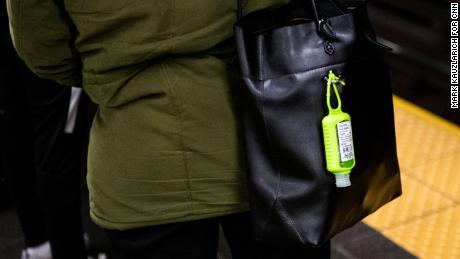 With more than 100 confirmed coronavirus cases across New York State, high-grade disinfectants are being splashed on everything from turnstiles and ticket machines to the subway's 6,714 cars and 1,100-plus commuter rail cars, according to the MTA. "Your safety is our highest priority and, as such, we're going above and beyond recommendations from health experts to disinfect the system," Foye said last week. Still, densely packed trains and buses — where it's often hard to stand inches away from others when the CDC recommends six feet to avoid infection — can be fertile ground for the spread of the virus.
With more than 100 confirmed coronavirus cases across New York State, high-grade disinfectants are being splashed on everything from turnstiles and ticket machines to the subway's 6,714 cars and 1,100-plus commuter rail cars, according to the MTA. "Your safety is our highest priority and, as such, we're going above and beyond recommendations from health experts to disinfect the system," Foye said last week. Still, densely packed trains and buses — where it's often hard to stand inches away from others when the CDC recommends six feet to avoid infection — can be fertile ground for the spread of the virus. 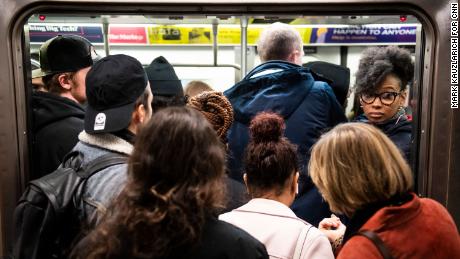 Transmission between people happens when someone comes into contact with an infected person's secretions, such as droplets in a cough.Depending on how virulent the virus is, a cough, sneeze or handshake could cause exposure. The virus can be transmitted by coming into contact with something an infected person has touched and then touching your mouth, nose or eyes."The risk is related basically to proximity of infected people, how long you're on the subway and obviously the number of exposures you may have," said Morse, who uses the subway every day to get to work where his research interests include risk assessment of infectious diseases."So, if there are infected people near you, obviously then it's a matter of density. But we don't know how many infected people there are out there."
Transmission between people happens when someone comes into contact with an infected person's secretions, such as droplets in a cough.Depending on how virulent the virus is, a cough, sneeze or handshake could cause exposure. The virus can be transmitted by coming into contact with something an infected person has touched and then touching your mouth, nose or eyes."The risk is related basically to proximity of infected people, how long you're on the subway and obviously the number of exposures you may have," said Morse, who uses the subway every day to get to work where his research interests include risk assessment of infectious diseases."So, if there are infected people near you, obviously then it's a matter of density. But we don't know how many infected people there are out there."
Visiting New York with 100 medical masks and hand sanitizer
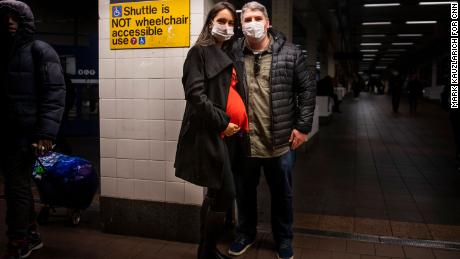 Beneath bustling Grand Central Terminal in midtown Manhattan, a public service announcement plays from speakers on the subway platforms. It advises riders to wash their hands and cover their mouths when they cough or sneeze. The same message scrolls across station screens.Leonardo Gayer, 37, a marketing director for an energy drink company, and his wife Vanessa, 37, pushed through the turnstiles wearing white surgical masks. They're visiting the city from Brazil and packed a box of 100 masks and several bottles of hand sanitizer in their luggage.Vanessa Gayer showed the hand sanitizer bottle she carries everywhere. They use it the moment they leave the subway. She's six months pregnant.
Beneath bustling Grand Central Terminal in midtown Manhattan, a public service announcement plays from speakers on the subway platforms. It advises riders to wash their hands and cover their mouths when they cough or sneeze. The same message scrolls across station screens.Leonardo Gayer, 37, a marketing director for an energy drink company, and his wife Vanessa, 37, pushed through the turnstiles wearing white surgical masks. They're visiting the city from Brazil and packed a box of 100 masks and several bottles of hand sanitizer in their luggage.Vanessa Gayer showed the hand sanitizer bottle she carries everywhere. They use it the moment they leave the subway. She's six months pregnant. 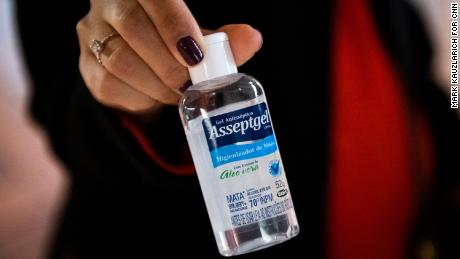 "That's our main concern," her husband said of her pregnancy. In Brazil — which has just over a dozen coronavirus cases compared to more than 500 and 21 deaths in the United States — people are "getting crazy" and panicky about the outbreak, Vanessa Gayer said. "In Brazil, we are more concerned than here because nobody is wearing masks here," Leonardo Gayer said. "It's strange."They were headed to the 9/11 Memorial and Museum downtown, where they said they planned on wearing the masks if it was crowded. Across town, college student John Yang, 23, wore a surgical mask as he traveled with a friend on a train under Manhattan's Upper West Side. He said he was as concerned about mounting racist assaults against Asians as he was about the spread of coronavirus. "There are a lot of people getting beat up for wearing masks," Yang said. "I feel like I'm pretty westernized, but I still have Chinese roots … I'm traveling with my boy though."
"That's our main concern," her husband said of her pregnancy. In Brazil — which has just over a dozen coronavirus cases compared to more than 500 and 21 deaths in the United States — people are "getting crazy" and panicky about the outbreak, Vanessa Gayer said. "In Brazil, we are more concerned than here because nobody is wearing masks here," Leonardo Gayer said. "It's strange."They were headed to the 9/11 Memorial and Museum downtown, where they said they planned on wearing the masks if it was crowded. Across town, college student John Yang, 23, wore a surgical mask as he traveled with a friend on a train under Manhattan's Upper West Side. He said he was as concerned about mounting racist assaults against Asians as he was about the spread of coronavirus. "There are a lot of people getting beat up for wearing masks," Yang said. "I feel like I'm pretty westernized, but I still have Chinese roots … I'm traveling with my boy though."
Transit agency to employees: Don't wear masks on the job
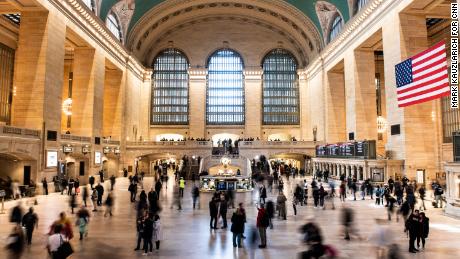 The use of medical face masks had sparked friction between the MTA and the Transport Workers Union, which represents about 40,000 subway and bus workers. The agency last week ordered a train operator who refused to remove a surgical mask to sit in a break room for at least two shifts, union officials said. "It's optics. If there is a bus operator with a mask, they feel the public is going to say, 'Oh, he's wRead More – Source
The use of medical face masks had sparked friction between the MTA and the Transport Workers Union, which represents about 40,000 subway and bus workers. The agency last week ordered a train operator who refused to remove a surgical mask to sit in a break room for at least two shifts, union officials said. "It's optics. If there is a bus operator with a mask, they feel the public is going to say, 'Oh, he's wRead More – Source
Two stops later, the epidemiology professor at New York University's School of Global Public Health scored a prized seat next to a car door. To her immediate right was a woman fidgeting with a cell phone and another whose face was hidden below the eyes by a white surgical mask. A subway rider leaned on a metal pole a couple of feet away, looking around and pressing a black scarf against her nose and mouth. "Last week somebody near me was coughing," said Gershon, a disaster preparedness expert and subway regular. "I took a tissue and covered my nose and my mouth. I have glasses on already, which is good. You know, the way in also is the eyes."A way into the body for the coronavirus, whose spread has unleashed anxiety across the nation's largest transit system — which has never shut down due to health concerns. Crowded trains each weekday carry more than 5 million people hardened by terror threats and track-dwelling rats, daylight assaults and diluvial water main breaks. COVID-19 is their latest worry. "I do think they are potentially at risk because you're in close quarters and sometimes you can't escape if somebody is really near you and the train is packed," said Gershon, a native New Yorker. On Monday, Metropolitan Transportation Authority chairman and CEO Pat Foye sought to assure the public the trains "remain safe" but urged people with health issues, "If you can get around without riding the subway, do it.""If you experience symptoms like fever or respiratory issues or have compromised immunity, or other serious health issues, it's good advice always, to avoid large crowds," he told reporters. The message came on the day state officials revealed Rick Cotton, executive director of the Port Authority of New York and New Jersey, tested positive for the coronavirus. Cotton is under quarantine and will continue working from home, Gov. Andrew Cuomo said. The Port Authority oversees much of New York City's travel infrastructure, including some airports, tunnels, bridges and seaports.Mayor Bill de Blasio urged some New Yorkers Sunday to avoid the subway. He called for employers to stagger work hours for employees to ease overcrowding. "If you're sick, you shouldn't be going on the subway," he told reporters. "If you are traveling by subway and the train that comes up is all packed and you can possibly wait for the next train in the hopes it might be less packed, please do," the mayor added. "We've all been sardines in the subway. If you have the option of walking or biking to work, please do that."De Blasio is also asking the Food and Drug Administration to approve automatic tests for coronavirus. "The FDA needs to approve the automated tests," de Blasio said Monday afternoon. He noted results are received every day, but could be more frequent if the FDA were to approve automated tests "with the stroke of a pen."
Transit system undergoes a deep cleaning
The MTA, the state agency that runs the subway, buses and commuter rails, last week announced it was using bleach and other disinfectants recommended by the US Centers for Disease Control and Prevention to scour all equipment in the system every 72 hours. The major cleaning includes 472 subway stations, 21 stations on Staten Island Railway, 124 stations and terminals on the Long Island Rail Road and 101 Metro-North stations. "Even if you clean it twice a day, if someone happens just by chance to come on who's infected and their hands may be contaminated — they just sneezed into their hands and they put their hand on some surface — the cleaning only works for a short time," said Stephen Morse, 68, an epidemiology professor at Columbia University's Mailman School of Public Health. "It's really up to all of us to take the precautions to protect ourselves." Subway and bus riders are urged to wash their hands with soap and water for at least 20 seconds, or use hand sanitizer with at least 60% alcohol, after disembarking, according to experts. Hand sanitizers have been in short supply nationwide.
People should 'go about their everyday lives — use the subway, take the bus'
 With more than 100 confirmed coronavirus cases across New York State, high-grade disinfectants are being splashed on everything from turnstiles and ticket machines to the subway's 6,714 cars and 1,100-plus commuter rail cars, according to the MTA. "Your safety is our highest priority and, as such, we're going above and beyond recommendations from health experts to disinfect the system," Foye said last week. Still, densely packed trains and buses — where it's often hard to stand inches away from others when the CDC recommends six feet to avoid infection — can be fertile ground for the spread of the virus.
With more than 100 confirmed coronavirus cases across New York State, high-grade disinfectants are being splashed on everything from turnstiles and ticket machines to the subway's 6,714 cars and 1,100-plus commuter rail cars, according to the MTA. "Your safety is our highest priority and, as such, we're going above and beyond recommendations from health experts to disinfect the system," Foye said last week. Still, densely packed trains and buses — where it's often hard to stand inches away from others when the CDC recommends six feet to avoid infection — can be fertile ground for the spread of the virus.  Transmission between people happens when someone comes into contact with an infected person's secretions, such as droplets in a cough.Depending on how virulent the virus is, a cough, sneeze or handshake could cause exposure. The virus can be transmitted by coming into contact with something an infected person has touched and then touching your mouth, nose or eyes."The risk is related basically to proximity of infected people, how long you're on the subway and obviously the number of exposures you may have," said Morse, who uses the subway every day to get to work where his research interests include risk assessment of infectious diseases."So, if there are infected people near you, obviously then it's a matter of density. But we don't know how many infected people there are out there."
Transmission between people happens when someone comes into contact with an infected person's secretions, such as droplets in a cough.Depending on how virulent the virus is, a cough, sneeze or handshake could cause exposure. The virus can be transmitted by coming into contact with something an infected person has touched and then touching your mouth, nose or eyes."The risk is related basically to proximity of infected people, how long you're on the subway and obviously the number of exposures you may have," said Morse, who uses the subway every day to get to work where his research interests include risk assessment of infectious diseases."So, if there are infected people near you, obviously then it's a matter of density. But we don't know how many infected people there are out there."
Visiting New York with 100 medical masks and hand sanitizer
 Beneath bustling Grand Central Terminal in midtown Manhattan, a public service announcement plays from speakers on the subway platforms. It advises riders to wash their hands and cover their mouths when they cough or sneeze. The same message scrolls across station screens.Leonardo Gayer, 37, a marketing director for an energy drink company, and his wife Vanessa, 37, pushed through the turnstiles wearing white surgical masks. They're visiting the city from Brazil and packed a box of 100 masks and several bottles of hand sanitizer in their luggage.Vanessa Gayer showed the hand sanitizer bottle she carries everywhere. They use it the moment they leave the subway. She's six months pregnant.
Beneath bustling Grand Central Terminal in midtown Manhattan, a public service announcement plays from speakers on the subway platforms. It advises riders to wash their hands and cover their mouths when they cough or sneeze. The same message scrolls across station screens.Leonardo Gayer, 37, a marketing director for an energy drink company, and his wife Vanessa, 37, pushed through the turnstiles wearing white surgical masks. They're visiting the city from Brazil and packed a box of 100 masks and several bottles of hand sanitizer in their luggage.Vanessa Gayer showed the hand sanitizer bottle she carries everywhere. They use it the moment they leave the subway. She's six months pregnant.  "That's our main concern," her husband said of her pregnancy. In Brazil — which has just over a dozen coronavirus cases compared to more than 500 and 21 deaths in the United States — people are "getting crazy" and panicky about the outbreak, Vanessa Gayer said. "In Brazil, we are more concerned than here because nobody is wearing masks here," Leonardo Gayer said. "It's strange."They were headed to the 9/11 Memorial and Museum downtown, where they said they planned on wearing the masks if it was crowded. Across town, college student John Yang, 23, wore a surgical mask as he traveled with a friend on a train under Manhattan's Upper West Side. He said he was as concerned about mounting racist assaults against Asians as he was about the spread of coronavirus. "There are a lot of people getting beat up for wearing masks," Yang said. "I feel like I'm pretty westernized, but I still have Chinese roots … I'm traveling with my boy though."
"That's our main concern," her husband said of her pregnancy. In Brazil — which has just over a dozen coronavirus cases compared to more than 500 and 21 deaths in the United States — people are "getting crazy" and panicky about the outbreak, Vanessa Gayer said. "In Brazil, we are more concerned than here because nobody is wearing masks here," Leonardo Gayer said. "It's strange."They were headed to the 9/11 Memorial and Museum downtown, where they said they planned on wearing the masks if it was crowded. Across town, college student John Yang, 23, wore a surgical mask as he traveled with a friend on a train under Manhattan's Upper West Side. He said he was as concerned about mounting racist assaults against Asians as he was about the spread of coronavirus. "There are a lot of people getting beat up for wearing masks," Yang said. "I feel like I'm pretty westernized, but I still have Chinese roots … I'm traveling with my boy though."
Transit agency to employees: Don't wear masks on the job
 The use of medical face masks had sparked friction between the MTA and the Transport Workers Union, which represents about 40,000 subway and bus workers. The agency last week ordered a train operator who refused to remove a surgical mask to sit in a break room for at least two shifts, union officials said. "It's optics. If there is a bus operator with a mask, they feel the public is going to say, 'Oh, he's wRead More – Source
The use of medical face masks had sparked friction between the MTA and the Transport Workers Union, which represents about 40,000 subway and bus workers. The agency last week ordered a train operator who refused to remove a surgical mask to sit in a break room for at least two shifts, union officials said. "It's optics. If there is a bus operator with a mask, they feel the public is going to say, 'Oh, he's wRead More – Source











